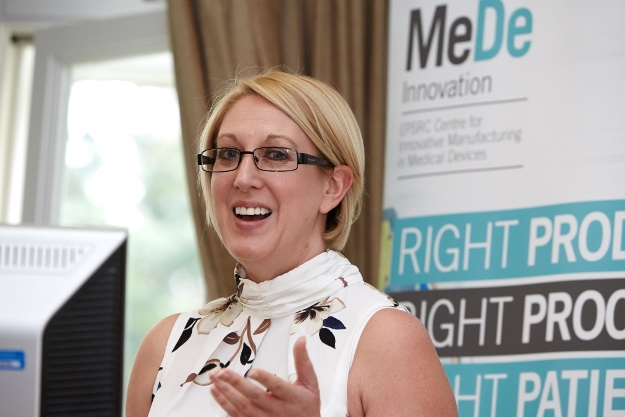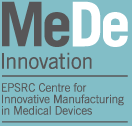Biomimetics to Inform the Manufacture of Medical Devices – September event outcomes

September 19, 2014
MeDe Innovation Research Workshop, 18 September 2014
On Thursday 18th September 2014, the University of Sheffield hosted the first MeDe Innovation research workshop to highlight the latest in research in Biological & Biomimetic Materials for Medical Devices & Health Technologies. The event was attended by over 70 representatives from industry, universities and hospitals.
Natural materials have arguably the longest history for use as medical devices, and this workshop demonstrated that they still have much to offer in terms of functional performance and regenerative capacity. Even where they do not themselves become a medical device, their remarkable properties inform the field of biomimetics where nature teaches manufacturers how to improve synthetic devices.
The key lesson taken from event discussion is that communication is integral, more obviously between academics, clinicians and industry, but also with specialists in intellectual property and the regulatory environment. Excellent science and improved communication would see further breakthroughs in the use of biological materials and biomimetics for the benefit of the UK industry and patients.
“Outstanding event, the balance between academic research and industrial content was perfect and very helpful” – event attendee
“The regulatory presentation was excellent” – event attendee
“The event was an excellent forum for exposure to new people, ideas and exciting new developments in the field, well worth attending for anybody with a serious interest in medical devices” – Chris Holland, event speaker, University of Sheffield.
Properties & Potential of Biological & Biomimetic Materials
The first session focussed on current research into biological materials and biomimetic strategies informing the development of new medical devices based on these emerging regenerative health technologies.
Chris Holland (University of Sheffield) opened the workshop with a fascinating description of research into silk proteins and their remarkable properties, drawing attention to how this science was being exploited in medical devices including cartilage repair and nerve regeneration.
Eileen Ingham (University of Leeds) followed with a detailed presentation that covered the use of processed natural tissues in cardiovascular and musculoskeletal repair, demonstrating how academic research had underpinned the development of optimised processing techniques that eliminated the risks associated with the use of natural materials in medicine while retaining key regenerative properties.
Matt Dalby (University of Glasgow) moved the workshop into the biomimetic arena with a description of cell responses to micro- and nanoscale surface features, demonstrating how simple modifications to topography could have the same influence on cell behaviour as more complex and expensive growth factors.
The academic session was concluded by Piergio Gentile (University of Sheffield and MeDe Innovation) who showed how surfaces could be functionalised using very safe and reproducible methods, illustrating his talk with compelling data on the incorporation of antimicrobial agents into a material surface using layer-by-layer fabrication.
The panel of speakers were joined by a local clinical academic, Professor Ian Brook. Lively discussion ensued, and it was evident that while natural materials and biomimetic strategies held great promise, surgeons and patients would need to be convinced that the regenerative benefits far outweighed any risks with interventions of this type.
Commercial & Business Factors in Translation & Exploitation
Appropriately, given the issues raised by the first panel, the second session included speakers with considerable expertise of the regulatory environment.
It was, opened by Giuseppe Tronci (University of Leeds) who showed the value of textile technologies in the translation of laboratory research to the clinic.
Nienke Lubben (HGF Ltd.) then moved the workshop towards the translational arena with a detailed description of the key issues that had to be considered when preparing to protect intellectual property, highlighting issues that were pertinent to natural materials and biological systems, and explaining how different countries had very different attitudes.
Jennifer Durrant (BSI Ltd.) followed this with a very insightful description of the changing regulatory environment in Europe and North America, illustrating how recent problems in the medical devices sector had led to an increased regulatory burden for manufacturers who used biological materials in the manufacture of medical devices.
Matt German (Newcastle University) showed how biomimetic strategies might address the considerable clinical challenges related to adhesion.
Networking Opportunities and Community Creation
The lunch time break provided an opportunity for delegates from across the medical device manufacturing sector to share information, knowledge and ideas and debate the challenges and issues facing the community. Exhibitors from BSI Ltd, The ElectroSpinning Company, Fripp Design and Research and MedTech Innovation Communications provided information on the services they can provide to the sector.
Commercial & Business Factors in Translation & Exploitation
Finally, three speakers from industry explained how businesses addressed manufacturing issues, perhaps the most important steps in translation from laboratory to patient.
Andrew Spragg (Jellagen Ltd.) provided a fascinating insight into the use of jellyfish, a renewable resource from the sea, as a source of high quality collagens for medical and related applications. He worked closely with Collagen Solutions Ltd who provided the next industrial speaker, and the audience learnt how animal tissues were processed to produce a safe and consistent product for medical use.
Finally, the session was concluded by Rebecca Goodchild (Ceramisys Ltd) who described the use of biomimetic calcium phosphates in medical devices with potent bone tissue regenerative capacity. The speakers were joined by Mehdi Tavakoli from the HealthTech and Medicine KTN to provide additional insight into national thinking related to promotion of innovation in medical devices and related technologies.
Launch of Fresh Ideas Fund
The concluding session was used to launch the new MeDe Innovation call for proposals entitled “Fresh Ideas”. Ceri Williams (MeDe Innovation) announced the call, and explained the title was chosen to focus the minds of applicants on early stage science that held great promise to meet current challenges or unmet clinical needs. Potential applicants were referred to the MeDe Innovation web site for further details on how to apply (https://mede-innovation.ac.uk//news-article/fresh-ideas-fund/).
Future events from MeDe Innovation
New Strategies for Treating MSK Disorders: in-clinic manufacture and minimally invasive implantation of materials
Thursday 30th October 2014, Centre for Life, Newcastle
Register at: https://in-clinic-manufacture.eventbrite.co.uk
Functionally Stratified Design and Manufacture of Orthopaedic Devices
Monday 17th November, University House, Leeds
Register at: https://stratified-design.eventbrite.co.uk
MeDe Innovation Annual Conference
Wednesday, 28th January 2015, Nottingham
Register at: https://mede-innovation2015.eventbrite.co.uk
